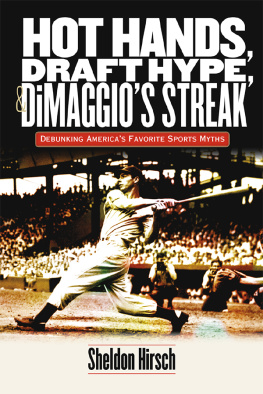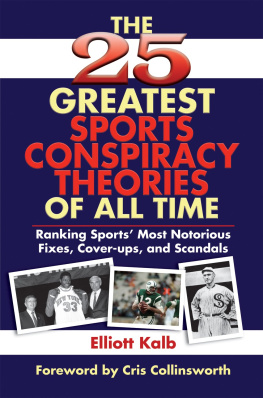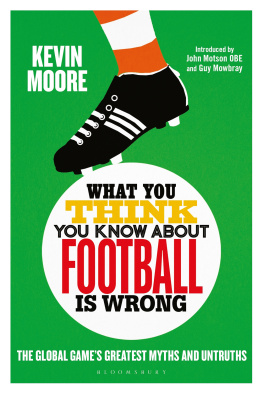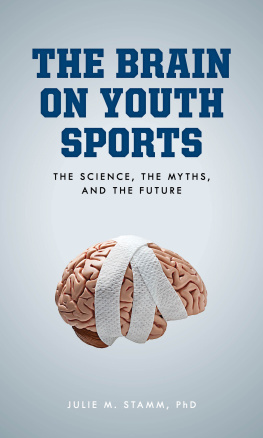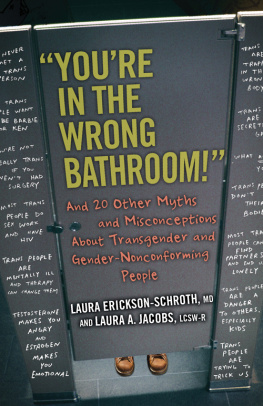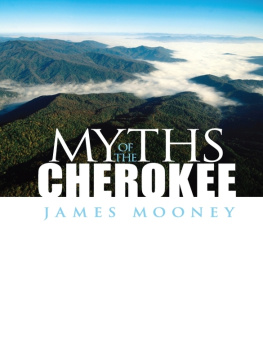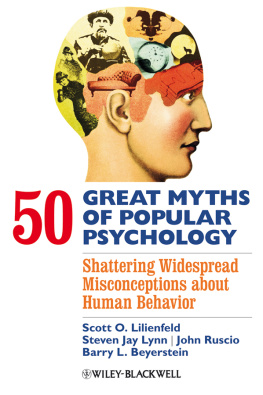TWO SPORTS MYTHS AND WHY THEYRE WRONG
RODNEY FORT AND JASON WINFREE
stanford briefs
An imprint of Stanford University Press
Stanford, California
Stanford University Press
Stanford, California
2013 by the Board of Trustees of the
Leland Stanford Junior University
No part of this book may be reproduced or transmitted in any form or by any means, electronic or mechanical, including photocopying and recording, or in any information storage or retrieval system without the prior written permission of Stanford University Press.
Printed in the United States of America on acid-free, archival-quality paper
Library of Congress Cataloging-in-Publication Data
Fort, Rodney D., author
[15 sports myths and why theyre wrong. Selections]
Two sports myths and why theyre wrong / Rodney Fort and Jason Winfree.
pages cm
Includes bibliographical references.
Consists of two chapters from the authors 15 sports myths and why theyre wrong.
ISBN 978-0-8047-8890-8 (pbk. : alk. paper)
ISBN 978-0-8047-8928-8 (e-book)
1. SportsEconomic aspectsUnited States. 2. Professional sportsEconomic aspectsUnited States. I. Winfree, Jason (Jason A.), author. II. Title. III. Title: 2 sports myths and why theyre wrong.
GV716.F6652 2013
338.4'7796 dc23 2013014692
Typeset at Stanford University Press in 10/13 Adobe Garamond
CONTENTS
INTRODUCTION
Let us begin with a confession: We are both sports fans and economists and, as a result, our worldview is curiously schizophrenic. Sports are an emotion-laden pastime by nature. Like all fans, we enjoy the old thrill of victory and agony of defeat. We root, root, root for the home team, hate the damn Yankees, and just wait until next year with the best of them. But as economists, we put aside these emotions and assume that cool rationality rules the world. (Even as economists, we know that this is not entirely true. But, this lens has proven useful to in our professional lives.) Our eyes are open. We see that reason can get us only so far as we seek to understand how the sports industry works. As the old Sioux grandfather, played by Chief Dan George, in the movie Little Big Man, said, Well, sometimes the magic works. Sometimes it doesnt. But when it doesnt, the failure of rationality can still point us in the direction of better explanations.
This Stanford Brief gives you a taste of our full-length book, 15 Sports Myths and Why Theyre Wrong. We wrote this book and we offer this snapshot of it because the economists in us began to see that many preconceived and deeply emotional notions in sports are simply not true. And upon further consideration, we began to see that these misunderstandings actually hinder the games we love. When we realized that these wives tales were not only plain wrong but also a drag on sports fans, players, and the industry alike, we had to do something. Also of a sudden, we found ourselves in a new rolethat of myth busters who were identifying the power of these stories and stomping them by applying the scrutiny of economic thinking. Myth busters typically approach their targets by pointing out how a belief, previously held dear, is simply incorrect. However, in our opinion, this approach doesnt go far enough. We also try to explain how these beliefs exemplify some ideology (that major league baseball should be structured like the National Football League), or serve the interest of specific people and institutions (players seeking higher salaries or team owners wanting to pass the cost of their players on to the fans, for instance). Going to this next level leads to penetrating insights. And then, we can use economic analysis to examine the motives behind these ideals and institutions.
Since 2007 weve been paring down a list of the most egregious myths in sportsby our accountto present to you with a systematic examination of the worst offenders. As you sample two of the juiciest misconceptions that we unearthed, youll discover incorrect, but popular, beliefs and will come to see them for what they are: tall tales. But the buck doesnt stop there. This exercise begs for more, and our aim is not only to tell you who is served by each myth but also to provide an explanation of how that party is served by its perpetuation.
As you read the two tall tales that follow or anticipate the 13 additional ones that 15 Sports Myths reveals, you may wonder, What do these myths have in common? Sports myths substitute intuitive appeal for a rigorous and more informed explanation of the issue or process at hand. In the hot and intense context of the game, few stop long enough to cease watching the plays and apply this kind of thinking. But, of course, careful thought and the application of analytical techniques typically bust myths. Second, as we have suggested, sports myths can serve the interests of those perpetrating the myth at the expense of those who, once enlightened, would abandon the myth and all of its associated baggage. So every one of these myths has a championand that person, group of conspirators, or goliath organization fans the myths fire for personal gain. It is not so easy to break free from these myths until we stop to consider them critically. Many, in fact, are passed down over generations. But it is our hope that the end is near for some of them.
There are plenty of other myths out there, but the two presented here and the thirteen others on which weve zeroed in have staying power and pose a real threat if they are not dispelled. These are not the myths du jour, this seasons news, but rather misconceptions that haunt the world of sports year in and year outand that are presented as such. If you read the myths that follow as a pair, you are sure to notice that some themes repeat. We dont mean to nag, but we do want you to see the patterns in these pitfalls. Those perennial thorns hold power, and wed be remiss if we didnt underscore them for you. Alternatively, we invite you to read these myths one by one. They are presented in a straightforward fashionknowing that you might pick up and put down this book during the MLB All-Star Game, football season, the world series, and so onand hoping that you might spread the word about these fallacies with fellow fans.
As Mark Twain said, It aint what you dont know that gets you into trouble. Its what you know for sure that just aint so. As fans, economists, and myth busters, we want the truth. We think you deserve it. And we hope that you find our approach to seeking it as insightful and valuable as we have.
PLAYER SALARY DEMANDS INCREASE TICKET PRICES
It bothers me enormously that no longer can a family of four see a game. Whats happened is the [player] salaries are so high, we have to keep raising ticket prices. I dont want to raise my prices again.
Abe Pollin, former owner of the Washington Wizards and Capitals (Heath, 1997)
INTRODUCTION
If even an owner says it, shouldnt it be true? No wonder fans bemoan what they think are the facts. First, fans bemoan that tickets are too expensive. The Fan Cost Index is a sort of CPI for live attendance at North American pro sports games published by Team Marketing Reports (www.teammarketing.com). Their sports market basket for two adults and two children includes tickets, refreshments, parking, and souvenirs. While not all fans incur all of these expenses every time they attend, the index is useful for comparison between teams and over time. We choose the NFL because it is the most expensive (the most recent Fan Cost Index data are for 2011). The New York Jets topped NFL average ticket prices for 2011 at $120.85, and the New England Patriots topped premium ticket prices at $566.67. Adding in the rest of the basket, the price of the 2011 sports market basket for the NFL ranges from Jacksonville at the bottom, $316.50, to the Jets at the top, $628.90 (the average was about $427). Taking the average family to some pro games looks more like a trip to Disneyland than the trip to the stadium their parents might remember as kids.
Next page

